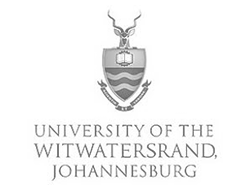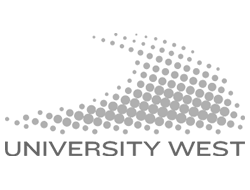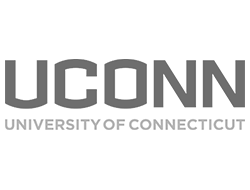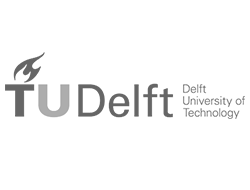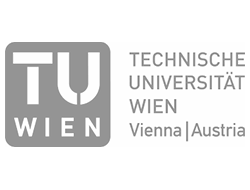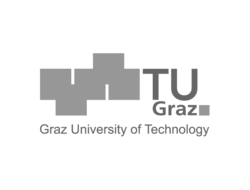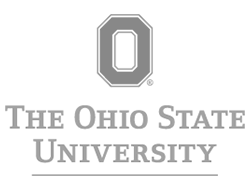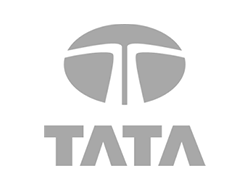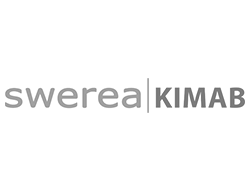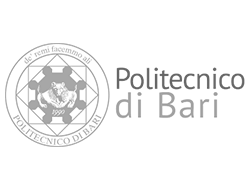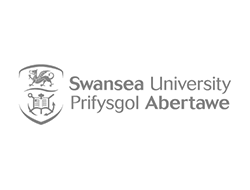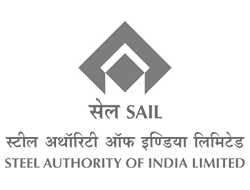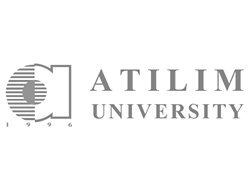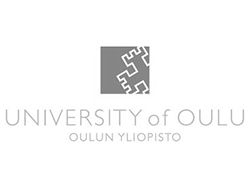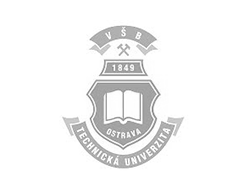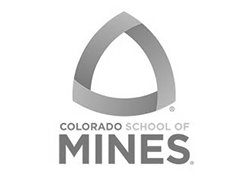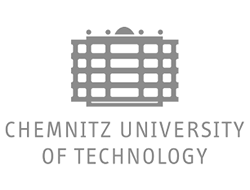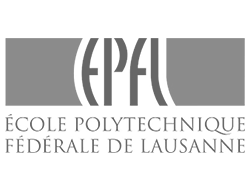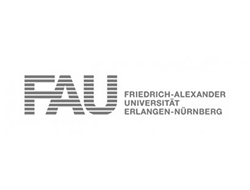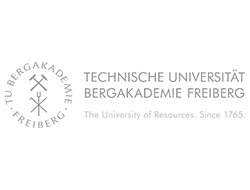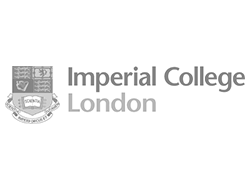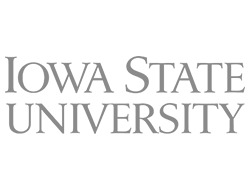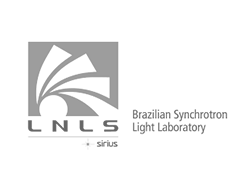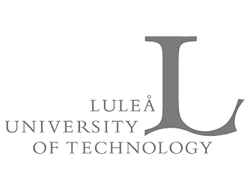Gleeble 3800-GTC
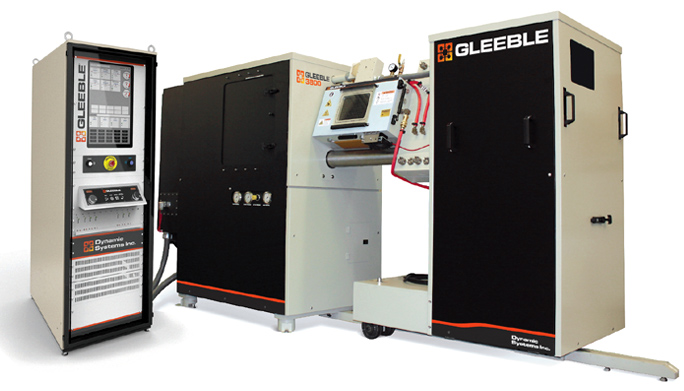
The Gleeble 3800-GTC System offers the versatility and performance needed for today’s demanding research applications. Each system includes the all-new Gleeble Touch Control (GTC) console, Windows workstation, load unit with test chamber, and a hydraulic power supply. Click here to download the Gleeble Solutions Guide |
Thermal-Mechanical Physical Simulation SystemThe Gleeble 3800-GTC is the most powerful standard system offered by Dynamic Systems Inc. and is capable of exerting as much as 20 tons of static force, heating specimens at a rate exceeding 10,000ºC/sec and achieving stroke rates up to 2,000mm/sec. The system’s flexibility allows for a wide variety of testing and simulation options, however its impressive capabilities make it particularly well suited for hot rolling and multi-hit forging simulations.
Designed to offer capabilities for hot deformation simulations on large specimens, the Gleeble 3800-GTC is equipped with a heavy-duty mechanical system and high-speed servo valves for quick response. Through its powerful physical simulation capabilities, the Gleeble 3800-GTC delivers the technical leverage that competitive organizations need to cut costs, shorten time to market, and open the door to new ideas.
The Gleeble 3800-GTC features an integrated touch-screen display with a Windows®-based computer, along with an array of powerful processors to provide an extremely user-friendly interface for preparing simulation programs, providing digital closed-loop control of the thermal and mechanical systems and collecting test data and subsequently analyzing the results.
Every Gleeble 3800-GTC is equipped to use Mobile Conversion Units (MCUs) which allow the Gleeble to be changed easily from one test configuration to another. The result is a system unequaled for physical simulation capabilities.
|
The Thermal System
The direct resistance heating system of the Gleeble 3800-GTC can heat specimens at rates of more than 10,000°C/sec, or can hold steady-state equilibrium temperatures within ±1°C. Thermocouples or an optional infrared pyrometer provide signals for accurate feedback control of specimen temperature. Water-cooled jaw carriers hold the specimen, making the Gleeble 3800-GTC capable of high cooling rates. The maximum cooling rate is determined by the size, shape, temperature, and composition of the sample. The thermal system provides smooth control of cooling from equilibrium to the maximum rate for any given specimen. An optional quench system can produce cooling rates in excess of 10,000°C/sec at the specimen surface.
Induction Heating Option: Gleeble 3500-GTC and 3800-GTC systems, including the Gleeble 3800-GTC-20/20, can be supplied with an optional Induction Heating system to complement the industry leading performance of the well-known Gleeble direct resistance heating technology.
Induction heating is suited for use in uniaxial compression testing (flow stress) where it can provide a uniform temperature across the specimen from anvil to anvil. Induction heating can also be used in tensile testing. The system allows the user to select either induction or resistance heating based on the needs of each specific test. The full capability of the high speed Gleeble direct resistance heating system is still maintained, allowing heating rates up to 10,000ºC/second when using direct resistance heating. The two heating systems are both integrated to work on the Gleeble and software can be used to select which heating system is used in each test.
Click here to learn more about the Gleeble Induction Heating option.
The Mechanical System
The Gleeble 3800-GTC mechanical system is a complete, fully integrated system capable of exerting as much as 20 tons of static force in compression and 10 tons of force in tension. Stroke displacement rates can be programmed to be as fast as 2,000mm/sec. A closed-loop hydraulic servo system provides precise control of all mechanical variables. Linear Variable Differential Transformers (LVDTs) provide feedback to ensure accurate execution and repeatability of the mechanical test program. The mechanical system features control feedback mode transition capabilities that allow the operator to program changes from one control mode to another during a given test. This capability provides the versatility that is necessary to simulate many thermal-mechanical processes. The program can switch between control variables at any time and as often as required during the test. Control modes that are available include stroke displacement, force, crosswise extensometry, lengthwise extensometry, true stress, true strain, engineering stress, and engineering strain.
Gleeble 3800-GTC Specifications:
| Force | Maximum Compressive Force | 20 Metric Tons |
| Maximum Tensile Force - Gleeble 3800-GTC (Standard) |
10 Metric Tons |
|
| Maximum Tensile Force - Gleeble 3800-GTC-20/20 | 20 Metric Tons | |
| Stroke | Maximum Stroke Distance | 125 mm |
| Maximum Stroke Rate | 2000 mm/sec | |
| Minimum Stroke Rate | .001 mm/sec | |
| Temperature Control | Maximum Temperature | 3000 °C |
| Maximum Heating Rate | 10000 °C/sec | |
| Maximum Quenching Rate | 10000 °C/sec | |
| Maximum Specimen Size | 20 mm diameter |
|
Measurement Systems
Gleeble systems are available in several models, each with a wide variety of available options and configurations. This flexibility allows the tailoring of a Gleeble system to meet your exact testing requirements. DSI offers a range of measurement systems including contact and non-contact options. Click here to learn more about some of DSI's most popular measurement options.
The Gleeble 3800-GTC Digital Control System
The heart of the Gleeble 3800-GTC is the all-new Gleeble Touch Control (GTC) system which provides a user-friendly interface enabling Gleeble operators to program and control the system. It provides all the signals necessary to control thermal and mechanical test variables simultaneously through the digital closed-loop thermal and mechanical servo systems. The Gleeble 3800-GTC can be operated totally by computer, totally by manual control, or by any combination of computer and manual
control to provide maximum versatility in materials testing.
The Gleeble 3800-GTC has a full set of software tools available. The operator can create tests on the workstation through a number of programming options, including QuikSim IITM software, a spreadsheet-like, fill-in-the-blanks software that describes each action in a test sequence. Other options for creating more elaborate tests include Deformation Control Software and Gleeble Script Language. In designing the operator interface for the Gleeble 3800-GTC, DSI engineers recognized that highly
flexible control is essential for machine performance. As a result, the 3800-GTC provides the operator total flexibility in control of the system.
Add Capabilities with Mobile Conversion Units (MCUs):
|
Thermal Cycles and Heat Treatments: Many different grips are available to support uniform temperature zones and a variety of specimen configurations. Other grips can be used to provide thermal gradients in the specimen for weld HAZ and process simulation. |
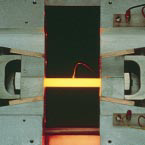 |
|
ISO-T Flow Stress Compression Testing: ISO-T flow stress compression anvils provide a uniform temperature distribution throughout the compression specimen during single- and multiple-hit deformation tests. |
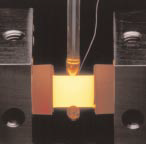 |
|
Melting & Solidification: Melting and solidification can be performed in-situ. Thermal and mechanical testing of the as-cast structure can then be performed. |
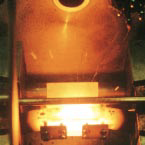 |
|
Strain Induced Crack Opening (SICO) Procedure: A Gleeble exclusive, the SICO procedure is a quick and cost-effective method for thermomechanical process optimization. |
 |
|
Hot/Warm Deformation: Plane strain compression test. In single- or multiple hit compression tests, strain and strain rate are controlled separately yet synchronously using the optional Hydrawedge®. |
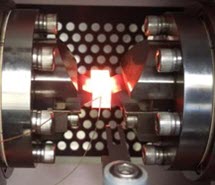 |
|
Strip Annealing Process Simulation: Both batch and continuous annealing processes can be simulated using a strip annealing jaw system. |
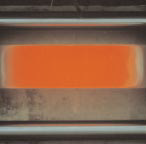 |
For additional information and customization options,
please contact us at info@gleeble.com or +1 (518) 283-5350.




